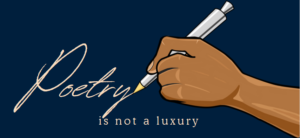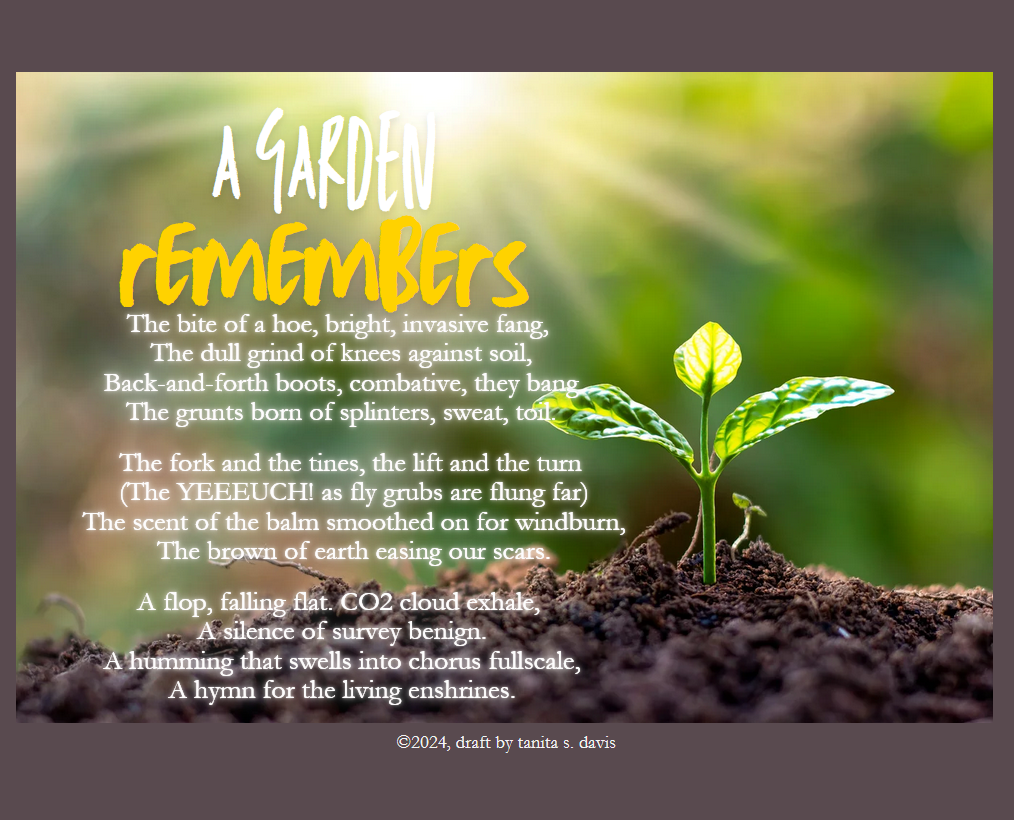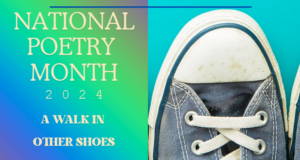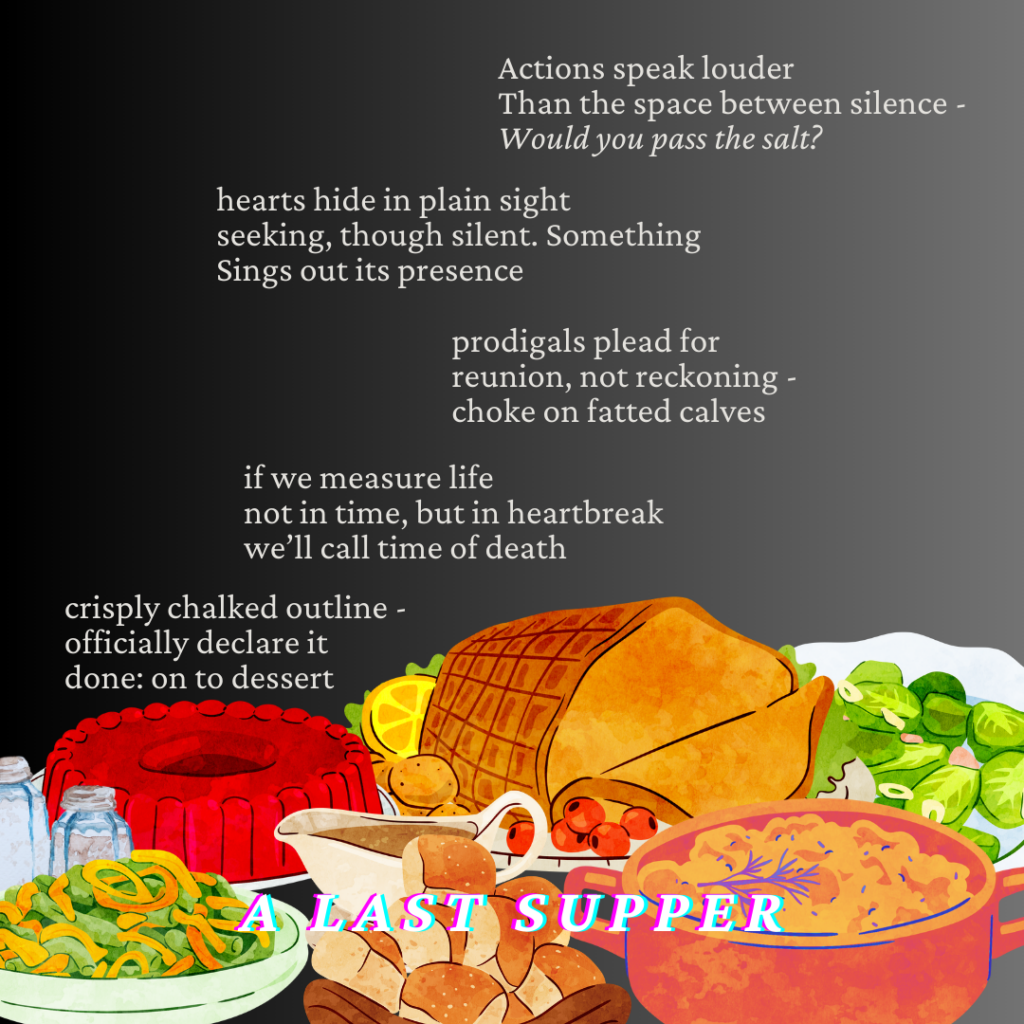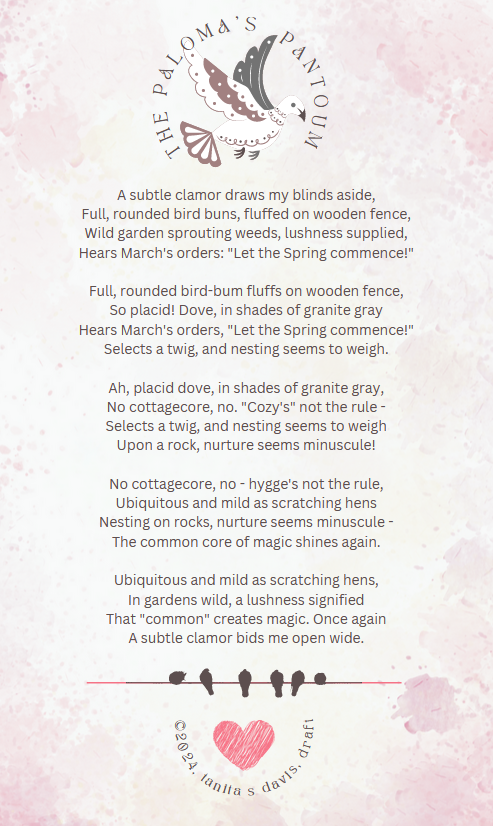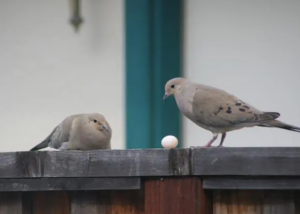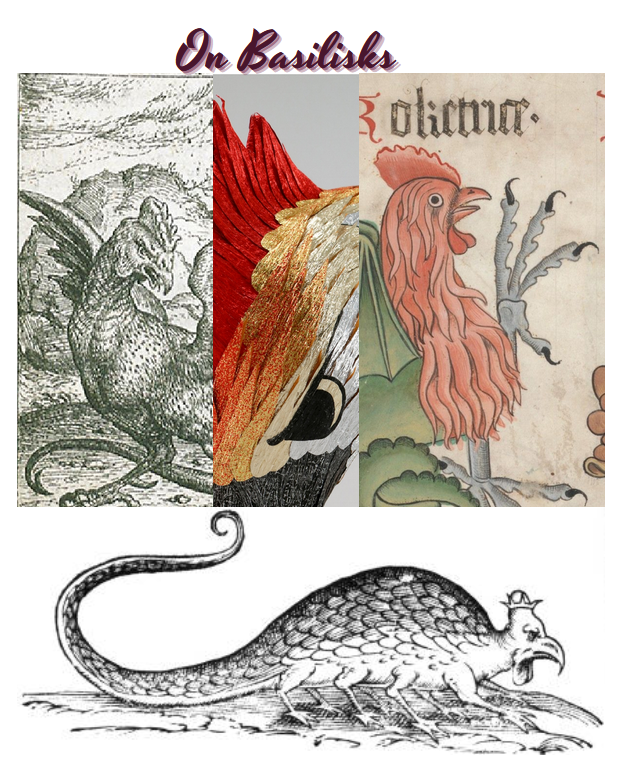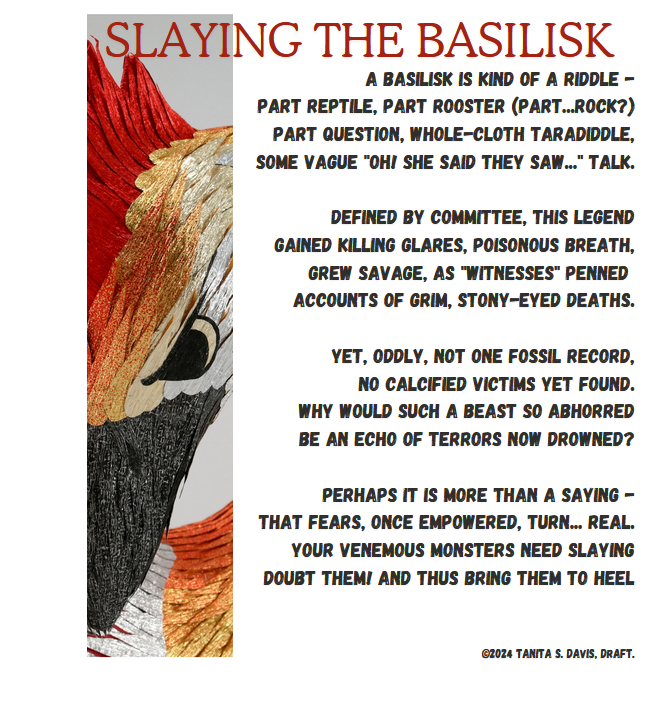Welcome to another Poetry Friday Poetry Peeps Adventure!
Poetry Peeps! You’re invited to our challenge for the month of July! Here’s the scoop: We’re indulging in ekphrastics – poetry based on pictures. We’ll be exchanging images from our personal stashes, but we’re also free to use photo from sites like Unsplash or the Library of Congress’ pictorial library to help us out. From there our poems will grow out of whatever form, topic, length, or theme. Are you game? Good! You have a month to craft your classified creation and share it on August 30th in a post and/or on social media with the tag #PoetryPals.
Poetry Pea podcast: “Hino Sōjō observed that senryū are poems that make people nod in agreement whereas haiku make people feel.” Don’t you love that? I hope you feel that nod happen for you today!
The last time we did this exercise, in 2012, I moaned about it a great deal, MOSTLY because I’d just finished an international move and still had book deadlines, but also, because haiku ads only SOUND easy, or clever people would put them in the paper and online all the time. Such a short form you’d think you could make effortlessly clever and fun, but the haiku/senryu syllabic rules are definitely working against you. Last time I tried haiku ads, were doing a “12 Poems in 12 Months” challenge that, little did we know, would end up being something we’ve done for years now, and we had a Google doc where we could all comment on each other’s work – and fuss about it. This time, we were all so busy we couldn’t even get online together for our meetup. So… everyone’s poetry today is a full on surprise. That’ll be fun!
From Process…
Since I was missing the meet-up energy I usually get in the hour we spend talking about the challenge, any form issues, and our plans, I went back to those older blog posts, where I could, and reread our clever work. I actually really liked several of them, and it reminded me of the breadth of what counts as classified ads and how we could make them a bit more mysterious (Laura’s Riddle-ku style) and less straightforward. I also brushed up on senryu – what it is, and what it focuses on – because, despite my best efforts, I don’t think I’ve written a real haiku ever in my life. Finally I perused other people’s efforts. Haiku Society of America’s senryu winners came with some really enlightening judges comments. The Atlantic’s contest was a lot of fun – some of them really made me chuckle. I feel like I’ve gotten a bit of a better feel for what the emotional range of senryu can be… even though that doesn’t mean I can definitely write it.
…To Poetry
One thing I read and observed is that the syllable form is much less strict with senryu – and I immediately decided that this time, I was going to have vari-syllabic verses. That… didn’t really happen. I tend to become very fixated on the structure of a thing, so I kept having to remind myself that “it doesn’t have to be 5-7-5. Of course, the minute I abandoned the rules, I didn’t actually like anything I wrote anymore. ☺ Typical. The second challenge was finding a leftover scrap of imagination as the next heat wave roared upon us. I began and discarded poems about breezes, wind, and cold air (there was quite a theme going on). Finally, I stepped away, determining that my best bet was to simply try writing one haiku a day, until I got more of a feel for what I was after.
I enjoy writing short poetry like this over a period of days sometimes because I can remember what I was thinking when I wrote it – and do that “nod in agreement” thing that senryu provokes in the best ways. For instance:
In search of the scoop
the straight dope from dawn’s chorus:
tweet me all the tea
This bird poetry comes courtesy of sleeping with all the windows and the slider open – and realizing just how early those little featherwits get up. I remind them that the dawn (gossip) chorus begins when there’s, you know, dawn? They disagree.
Unsought opinions
(Occasionally unhinged)
Averse ears only
Yes, these unsought opinions come in their original packaging, and they’re completely content-free!
Ah, we love an election year, don’t we? Bleh. Some of my acquaintances could really stand to keep their political texts/email forwards/comments to themselves…
Keen-eyed critic seeks
Unsentimental gazes
Hey – look me over.
I was writing a scene wherein a girl gets her first look at the engagement ring her mother’s boyfriend shows her, and I asked my writing group to gush-check me, because I am TERRIBLE at swoony scenes. I’m still the girl who asked her boyfriend, “So… are we doing this, or what?” Yes, that’s what he got for a proposal. Unsentimental gazes FTW!
Well post-bud bloom seeks
Sharp-honed shears, and speed
For circumspect snips.
Ohhh, I wanted to use secateurs – it’s such a delightful word! Sadly… far too many syllables!
July was a great month for a concise poetry form, as we’re all hip-deep in the requisite rounds of visitations and vacations that make up summertime. The brevity and the theme meant that many of us at least had a minute to try some, which makes it fun. Laura’s poem is here. Mary Lee’s poem is here. Tricia’s poem is here. Michelle K’s ads are here, Denise’s ad is here, and Jone’s ad inviting us a riparian life is here. More Peeps may haul out a haiku or two before the end of the weekend, so don’t forget to pop back to see the senryu/haiku ad round-up. Meanwhile, Marcie Flinchum Atkins (who has an interesting looking YA novel in verse upcoming!) is our Poetry Friday hostess today – thanks, Marcie! You’ll find the full Poetry Friday panoply @
Poetry Peeps! You’re invited to our challenge for the month of July! Here’s the scoop: We’re writing …Haiku/Senryu classifieds. Reprising our 2015 want ads project, we’re combining our love of Missing Connections, Desperately Seeking______, For Sale, and other random Penny Savers, Craigslist, and back-page-of-the-newspaper weirdness into deliciously brief poetry bites. Are you game? Good! You have a month to craft your classified creation and share it on July 28th in a post and/or on social media with the tag #PoetryPals. Friends, this is not a real poem. As long as we’re clear on that, okay? In the past, I was the person Most Likely To Rant about our poetry challenges, and heaven knows I’ve tried to tone that down a bit so Certain People stop giggling (looking at YOU Sara Lewis Holmes), but BOY did this one bring on the urge to scream. UGH.
I mean, technically it’s a poem – it’s …Poetry Friday and I posted it. But, that’s about all that went the way I wanted it to. Very rarely am I really, really, REALLY unable to put together words into something that at least resembles a poem… but whenever the Poetry Sisters say “no rules,” I hit a wall. This business of using the same title, but doing our own thing with no rules on form or content I KNEW was going to be a pain in the neck — so I started writing about what I wanted to write immediately. This…should have worked. In a way, it did work – I wrote a long poem in blank verse. However, I couldn’t tell when I was …done. After a while, I realized it was simply shaped prose instead of a poem. I scrapped it. I wrote a ghazel. Then two ghazels. All of them were terrible, but they had absolutely robust vocabulary, and best of all, they rhymed, which… tells some part of my brain that I’m Doing It Right. …except that Ghazels don’t rhyme (except internally), so… I scrapped those, too. Plus, did I mention they were terrible? I kept getting overly invested in the turns of phrase, and forgetting that the theme was wabi sabi. Paying attention. Transience. Imperfection. Change. I was like a kid who had the assignment – to write a paper about the Second World War and got stuck in a discussion on military haberdashery in 1944. It’s adjacent to the topic, but not there at all. After more reflection, I figured out that the real issue is that I don’t like wabi sabi as a… concept. I mean, it’s fine, but hello, it’s the melancholy awareness of the transience of living things. It’s a reminder that all things metamorphose, adapt, and die; a reminder that nothing is permanent or will stay the same or will last. Oh, goody, all of the things that the human brain is hardwired to ignore. Was this just an emotional wall I hit, a tantrum because I didn’t like the topic? No…? I mean, I wanted to write about having a big anniversary the year my brother is getting married – year one and year thirty, a month apart. That’s not a bad topic – but it’s personal. Maybe the struggle came with adding the personal to the transient – on a week when my Dad’s been hospitalized yet again. My literal baby, as in, “woke up with you, carried you, changed your diapers” baby brother is getting married. I know this is a tectonic change – that’s quite clearly being rubbed in my face. Maybe it’s just right now too much to put on one poem. That happens sometimes.
After this sprawling mess of realizations, one thing I also examined was why the first poems had disgusted me so much. I don’t usually …fling poems from me quite so energetically. Most of the time I make things work – and our Poetry Friday exercises have, for the last how many years (since 2007!?), been strictly about the PRACTICE of poetry, and not the PERFECTING thereof. But the poems struck me as slick, glib – and wordy. I can do that – I can produce words that sound good, at least – as tuneful as a drawer full of cutlery, if nothing else. But like that bright clatter, they’re basically meaningless. There’s a difference between wordplay and poetry, and too often, I err on the side of wordplay. Normally that’s fine – you can use wordplay to elevate your poem, but it’s a mistake to rely on it, and think it’s the same… Anyway, I knew I wasn’t really digging in and putting in the work to get to any Actual Feelings (TM) or Insights about the things my poem allegedly was about. So. I stopped writing. Honestly, it felt like my house was sitting on the surface of the sun, and it was too flippin’ hot to think straight anyway.
**** Fortunately, OTHER PEOPLE DID NOT POUT AND KEPT AT IT! **** Laura’s poem is here. Liz’s poem is here. Sara’s poem is here, and Mary Lee’s poem is here. Here’s Tricia’s poem, and she’s got the full Poetry Friday roundup today. Michelle K’s poem is here. Linda B’s broom wabi sabi is here. More of the wabi sabi-ing may be wafting in throughout the weekend, and I’ll post their odes to transience and imperfection as I find them – stay tuned for the roundup!
Okay, here it is, Thursday evening, and I’m left with what I’m left with – finally a lovely, temperate day and… a word salad. Flawed. Unfinished. Abandoned. As Richard Powell put it, “Nothing lasts, nothing is finished, and nothing is perfect.” Wabi sabi on the nose. WABI SABI: A Word Salad A squalid stuff, word salad – Imperfect and unfinished in still seeking distinction Clever clatter cannot cure If you can’t find the right words to write something this weekend – don’t despair. Remember that the genius is within you. The words are there – give yourself the time to think them. In the meantime, lying down with an ice pop certainly won’t hurt … Poetry Peeps! You’re invited to our challenge for the month of June! Here’s the scoop: We’re writing a poem with the title ‘Wabi-Sabi.’ Aaaand, that’s… the scoop. That’s it. A little unsure of the concept and philosophy? In his book Wabi-Sabi Simple, Richard Powell described wabi-sabi as a philosophy that acknowledges a lifestyle that appreciates and accepts three simple truths: “Nothing lasts, nothing is finished, and nothing is perfect.” We’ve left ourselves room this month to meditate on all sorts of things, including, but not limited to, ellipses, pauses, and periods to acknowledge endings. Are you game? Good! Whichever way wabi-sabi wafts you, you have a month to craft your creation and share it on June 28th in a post and/or on social media with the tag #PoetryPals. Friends, this month was a doozy. Periodically in our poetic perambulations, we wander into a quagmire and find ourselves just… stopped. Stuck. This time, it was because we were writing in the spirit of Lucille Clifton’s “homage to my hips,” and uncovered a lot of body image issues in ourselves. Here’s this lovely poet, praising the promising swing and sway of her bountiful hips, and we… recoiled from a paean of praise to our own bodies, because… eew. There was imperfection. There was wistfulness. There was frustration. There was a lot to dig through to get unstuck. Soooo, we had to do a little therapy. As one does. Results? Liz’s poem is here. Mary Lee’s affirmation is here. Tricia’s poem is here, and Laura’s is here. Michelle’s poem is here, and Linda B.’s poem is here. More peeps with poetic panegyric might sally forth to give thanks for their thighs – as I discover their poems, I’ll post them, so do check back for the roundup.
I was so, so grateful that I’d found the Bill Moyers’ recording of Lucille Clifton reading her own poem aloud. She made people laugh. She made people worry. She laughed at herself, and, gently, at their worry. She claimed she had “thrilling” body parts. In performance she was a live wire, and her joy in herself – in opposition to the societal norms which bid her condemn rather than celebrate the swish of her hips – is infectious. We all listened, and we none of us could resist that joy. So, step one, if you’re ever stuck writing something kind about yourself – listen to Ms. Lucille. I listened for the “presence” word as I reread the poem. Ms. Lucille’s hips are big, they take up space, they don’t fit just anywhere; those hips are free and have never been enslaved. They were mighty and magical, and then she offered us proof of this. When the poem is stepped through instead of skimmed, it is easier to see where her hips sort of “break through” the confinements and actions of other people’s calmer, tamer hips. With that in mind, I turned to my own poem.
Of course, that meant trying to find a body part that I could deal with. Oh, sure, I could have echoed the mentor poem, but Ms. Lucille had capital ‘h’ Hips. I have… a hinge that does the job, but without much ‘verve and swerve,’ as it were. I do have shoulders that hit all of the presence words – big, take up space, don’t fit… but five lines into trying to write about them, I became entangled in the metaphorical uses of shoulders – people use them to cry on, they have to bear the weight of the world’s problems. I have shoulders like a linebacker (with only minimal exaggeration) but I don’t always want to be leading the defense and protecting the quarterback. That’s… less about the shoulder and more about what a shoulder’s expected to do. Nope. Wrong direction. I sighed and considered. Belly buttons – what can one say about an ‘innie’ in a squishy belly? – necks – boring, really, – fingers – um, right now the joints are a bit too inflamed to be giving me praiseworthy vibes – feet, hips, spine, same issue. This is the problem with a flawed body, friends. A lot of my systems started to fail in my late twenties, and I’ve had somewhat of an adversarial relationship with my body since then. It’s too easy to find fault with it. Too easy to look at the scars of deficiencies and disorders and the associated insufficiencies and think there’s no room for homage, only abhorrence. And that’s …not good. Understandable, but not sustainable. I have to LIVE here, after all – we need a working relationship, and at minimum, respect and care and appreciation. So. Back to the drawing board yet again. I considered body parts which I actively dislike, but couldn’t summon the energy to fight myself for them. I wondered aloud if hair was a body part – I mean, technically that could count? – and then I saw a picture of a stairwell in a museum which I love, and remember walking down those stairs MANY years ago in three-inch heels (for an event) and thought, “I loved those shoes, they made my calves look…” Oh. OH! Suddenly, I was unstuck. These calves are strong calves, That was just the warm-up! There’s more poetry this Friday, hosted by Janice at Salt City Verse, exploring a great new poetry anthology, so check that out and the community’s poetry as well. Thanks much for hosting, Janice! Meanwhile, here are the calves in question: you’re WELCOME. Don’t forget what Ms. Lucille said. You have thrilling body parts. You are, both body and soul, breathtakingly made. Celebrate the wonderfulness that is you. Poetry Peeps! You’re invited to our challenge for the month of May! Here’s the scoop: We’re writing in the style of Lucille Clifton’s homage to my hips, and choosing our own body parts to pay homage to. Are you a fan of your neck? Have you always wanted to write a sonnet to the bumps on your tongue? You can read a few body part poems to get your motor running (or, listen to Miss Lucille read! You’ll get goosebumps). Are you game? Good! Whatever song of yourself that you sing, you have a month to craft your creation and share it on May 31st in a post and/or on social media with the tag #PoetryPals. Welcome to the wondering, as we sit in this space of unanswerable questions. This month’s challenge might have been a bit more complex to me if I hadn’t already been in a sort of… unfettered frame of mind. One thing that committing to writing a poem a day for NPM does for me is break me out of “regular” lines of thought, and make me fall swiftly into a state where I can dive deeper into words. A whole month of thinking sideways made unanswerable questions a little more accessible, a little more instinctual to me. There are others who grapple with the unanswerable this month. Sara’s poem is here. Tricia’s is here. Here’s Laura’s poem, and Liz’s poem is here, and Mary Lee’s poem is here. Michelle K’s poem is here. Other Poetry Peeps may be checking in throughout the weekend with their poems, so don’t forget to stop by for the roundup. In the meantime, Poetry Friday is hosted today by Ruth, @There Is No Such Thing As A Godforsaken Town. Thanks, Ruth! Our process was less straightforward this time, and more… gauzy. To begin, the Poetry Sisters got together and made lists of unanswerable questions – or what they felt were fairly esoteric questions in the moment. The list was long, but they were a delight to read through. How many rings in a doorbell? Where does an echo go? What is the best time to lose? How do you know when you’re grown? Who loves you best? What color is a mirror? How much change is enough? Why now? What does the oak know? Last month, Padraig Ó Tuama’s prompts for the pantoum really resonated with me. We were instructed to write a line about something that’s become ordinary for us, or to write a line showing us an object that’s associated with this ordinariness. In answering the prompt, I wrote about dirt, about dust and birds, fence posts, and the horizon through the window. What else, I wondered, could I expand on in a way that embraced the ordinary? People are cottage-core fixated on the After of the Before & After phases, when things are pretty, when the flowers are blooming and the honeysuckle is curling ’round the door. Cottagecore doesn’t seem to encompass sweating and tripping over dirt clods. The question that appealed most to me was a variation on the last… What does the oak know…about me? A few years ago, I wrote a mask poem about a plum tree which narrated its concerns (or lack of them), about the phoebe which lived in its branches, its human, and the world around it. I think of this poem as in conversation with that one. What does the garden remember of us? The weeding, turning, digging, and planting? The watering, sweating, grunting, squealing (in joy or dismay when spiders or crane fly larvae make themselves known)? The sighing, early morning stumbling, surly muttering or full-voice singing over the noise of the tiller? What do any of us know of this season, in comparison to what it knows about us? The bite of a hoe, bright, invasive fang, The fork and the tines, the lift and the turn A flop, falling flat. CO2 cloud exhale, Padraig’s last questions in the prompt list are, “What is a single feeling you have about this ordinary thing? What do you most wish to say about this ordinary thing?” To which I can only answer – it is, and I am, and together, we are – a living thing. May you raise your own hymn to the living this weekend, revel in your ordinary extraordinariness. My GOODNESS, it’s nearly the penultimate week of the month! Time to check in again with this month’s NPM Objective from The Use of Poetry and the Use of Criticism (1933), “Poetry may make us from time to time a little more aware of the deeper, unnamed feelings which form the substratum of our being, to which we rarely penetrate; for our lives are mostly a constant evasion of ourselves.” – T.S. Eliot A level deeper into my, erm, substratum, I think of the unnamed feelings I have surrounding the well-meaning. There is a woman with whom I peripherally interact in my volunteer work who is a fervent inclusivity ally. She consistently grabs the spotlight with her dogged insistence on letting all and sundry know that if anyone ‘better’ comes along to do any of the tasks she’s been assigned, she will step aside for them. That would only makes sense in a work environment, to move aside for the better qualified – and a savvy manager would make sure that happened. However, this is volunteer work, and her “better” is always a person of color. Have you ever tried to grab hold of the amorphous reasons behind WHY something feels discomfiting? Have you ever tried to do so in a poem? I have been sitting with those feelings and here I am – going to, without a mentor poem this time – blank them onto the page. (This IS A DRAFT, NOT A POEM) Am I going to want to make it all at least rhyme tomorrow? YES. Am I going to feel like it’s incoherent enough not to address real feelings? Yes. Is that going to matter? No – because… feelings, duh. If I knew why it was bothering me, I could write a better poem, but alas, smoke and sand… The more you try to hold them in your hands What troubles you is trouble’s thinning skin. Dust riding on the wind can’t slow this train We see all that we have here, what is known, Have you been following this year’s Progressive Poem? I am kicking myself for not jump in to add lines on an earlier date, in a way, as the poem now has… like, a name and an identity now, and maybe I should have worked with it when it was more of an amorphous zygote!? I hope I don’t ruin it. Meanwhile, Poetry Friday is celebrated today at Second Cousin Heidi’s juicy little universe, where you’ll find poems with clarity – and titles. Happy Friday. Happy Poetry Friday! I don’t know if you’ve ever seen the Brené Brown’s TED talk from a few years ago wherein she mentions a Christmas movie – a family in a car singing carols, the camera panning over the individual faces, and then — she stops the imaginary movie, then she asks people what happens next. People immediately say “car crash.” Others add to that, imagining oncologist based bad news, serial killers – menace. I heard this in a talk, and laughed out loud. Like, what the heck?! Who are the people who think that?! And what the hell is wrong with them? Um…? The people who think that is …us. Me. Brown talks about how many people feel like ‘the worst’ is always going to happen. We are fear-based society, raised in fear-based systems – even our faith is fear-based. Joy is greeted with foreboding, and disappointment is a state of being. When I got done laughing about this, I had to cry. I struggle to believe My faith confesses fact: Gifts get taken away Fear makes us grip too tight My one foot’s out the door, I felt this TED talk rated another repeating poem – but just to be difficult, I have returned to pantoums. Jone’s our hostess today, with a smart interview with the author of a most gorgeous ekphrastic anthology – and Jone herself has a photograph included. Thanks, Jone, and Happy Poetry Friday. Extended family isn’t something I ever talk about, or write about, I realize. Those… extensions run a long way, and while I don’t love them any less for it, those extensions rarely ever lend themselves to poetry. However, this morning I considered the OTHER extended family I have, by law. Cousin Mary Lee’s prompt to the Inklings’ poetry group this month was a haiku sequence in which they, using a mentor poem, talked about the topic of poetry without mentioning it by name. I was inspired to approach my own connections thusly, in a roundabout, gingerly fashion, carefully not naming – but letting the outline of a thing define its shape. I used both religious and forensic metaphors, which reflect specifics, and I was amazed by how much I wanted to reveal, when the object is to, in part, hint and obscure. I’ll have to try this again sometime… Actions speak louder hearts hide in plain sight prodigals plead for if we measure life crisply chalked outline – Poetry Friday today is hosted by Irene @ Live Your Poem. Poetry Peeps! You’re invited to our challenge for the month of April! Here’s the scoop: As a final celebration for National Poetry Month, we’re exploring the work of Rebecca Kai Dotlich and Georgia Heard’s, Welcome to the Wonder House, and noodling through answers to what we consider to be “unanswerable questions.” How do ants sound complaining? When do stars sing? Let’s wonder as we wander through the natural world – and ask and answer those wonderings in whatever way that appeals to you. Are you game? Good! Whatever way of seeing that you choose, you have a month to craft your creation and share it on April 26 in a post and/or on social media with the tag #PoetryPals. (P.S. – Here’s an answerable question: do you know what you’re doing for National Poetry Month this April? I’m taking part in the Progressive Poem for the first time, ever. Last I looked there were a few spots left…! If you’ve never done it, why not give it a shot?) *waves* Hello especially if you’ve dropped by today because you’re one of the St. Mary’s Episcopal School scholars, or one of the EIGHT HUNDRED readers from the San Mateo County Library District who had a school visit with me this week. Welcome! Since the pantoum is a familiar and well-loved form for our Poetry Peeps, this month Cousin Mary Lee introduced Padraig Ó Tuama from Poetry Unbound, to our practice. As our brief was to write a pantoum and include animals in some fashion, we felt free to come at the project from a variety of different ways. I used these eight prompts on different days and in varying moods to get the answers to questions which might take me deeper into the topic. In answering the questions, we began to expand our thinking about ordinary interactions. While I doubt I used these prompts entirely as directed, they were a welcome push in the right direction to get me started: Write a line about something that’s become ordinary for you: The restless shift of windblown leaves. Where does this ordinary thing happen? Dust baths of birds against expanse of earth. Write a line about time: When did you notice this ordinary thing had become ordinary? A year of watching shifts of shadow through walls of window. Other surrounding events: what happens before it? what happens after it? Clamor lifts the blinds like opened eyes, revealing drowsing birds on hard fence post bed. What is a single feeling you have about this ordinary thing? Amusement at our vastly different ideas of comfort – no cottage core cozy, but a slab of post. What do you most wish to say about this ordinary thing? (You may wish to imagine yourself speaking to a person you think will listen: it could be yourself.) Open your hand to the gift of ubiquity, dust baths and freedom to flee, lending magic to the earthbound. Write a line showing us an object that’s associated with this ordinary: A curtain drawn back opens me not to sky but to dirt. Write something about your body and this ordinariness: Widening eyes expansive as horizon’s wings, I too, will settle, not soar, yet still sing. A lot of us used this prompts in various ways – or not at all. This week’s host, our very own Miss Rumphius interpreted ‘animals pantoums’ in this way. Sara saw it thusly. Liz’s poem went this direction. Cousin Mary Lee’s pantouming pointed her this way. Laura’s poem is here. Michelle K.’s poem is here. Heidi’s cardinal poem is here. Carol V’s hummingbird is here. Denise K. brought a western fence/ lizard. Linda B. joins the party here, and Margaret brought elephants! More poets may be paso doblé-ing with the pantoum, so check in throughout the weekend, for the round up, won’t you? (Seeing as it’s Easter Weekend and I’m singing with either an a cappella sextet or a full chorus with organ, bells, strings and trumpet voluntary every day from now until Sunday, I might be slow, but I’ll get there!) As you can see, for me it was less about answering the questions and rearranging them for actual use in a poetry, and more… just idea generation, which I used as a springboard to create subtle differences in the way I use the traditional pantoum repetition. Once I started expanding on the prose ideas, combining the ordinary with an animal really came easily. What’s more ordinary in the backyard than a dove? I have to admit that I don’t know if my doves are rock pigeons, mourning doves, white-winged doves, or common ground doves. They’re just ubiquitous – and sketchy, fluttering off if I look at them too hard. But, they’re a very common bird that I have come to have a rather uncommon love for. Growing up, my father kept pigeons. They’re faithful parents, but their nest-building tends to surprise people. They lived on rocks, before they were domesticated, and they prefer rocks for nesting. They prefer pecking leftovers on the ground, than to eat from the feeder – as a matter of fact, they won’t. They are the most low-key, low-maintenance bird to invite to the yard – and they might stay, if they feel like it – or they might skitter off and you’ll never see them again. You can put out a nesting box, and they might use it. They’re just passing and yet, they show up every year anyway. I can’t quite figure them out, and yet they intrigue me. A subtle clamor draws my blinds aside, Full, rounded bird-bum fluffs on wooden fence, Ah, placid dove, in shades of granite gray, No cottagecore, no – hygge’s not the rule, Ubiquitous and mild as scratching hens, I wasn’t joking about their preference for fence posts and their tendency to “select a twig” and weigh the idea of making an actual nest; rock pigeons and doves make equally flimsy, horrifying-to-non-dove-observers, deeply un-cozy nests. This image is courtesy of Nancy Carver of Livermore, from our local paper’s annual weird nest “contest” several years ago. What ordinary thing captures your heart, and elevates your thoughts? What beauty and grace is there in the commonplace in your life? May it pry your heart open wide this weekend. Pax.♥ Poetry Peeps! You’re invited to our challenge for the month of March! Here’s the scoop: We’re writing animal pantoums. This delightful Malaysian poetic form will pair perfectly with beasts of all kinds – wild or domesticated. Are you game? Good! Whatever way of seeing that you choose, you have a month to craft your creation and share it on March 29 in a post and/or on social media with the tag #PoetryPals. I love letters, and I don’t think it’s unfair to say that I could write a pretty good love letter if I put my mind to it… but somehow writing a poetic epistolary felt beyond me this month. Mainly because I am… burnt out to ashes. There’s been a lot of drama going on (2024 CONTINUES to be that special snowflake) PLUS I have a bunch of editorial notes and a big fat revision going on – which is honestly great news, my editor is brilliant, but… I’m just pooped. My body tends to respond to stress by… stressing out further. There’s some switch in my brain that trips that keeps me up, unable to quiet my mind, because SOMETHING IS WRONG AND I MIGHT BE ABLE TO DO SOMETHING TO FIX EVERYTHING IF I JUST STAY UP AND OBSESS. Yeah, it hasn’t worked so far, but my brain remains determined. This month is supposed to be about writing love letters, but I have no love for insomnia, and that’s all I could fixate on. Kelly helpfully suggested that I might flip that script, and write about insomnia’s love …for me. Honestly? I hadn’t spent a lot of time thinking about anything but how grinding this was. Insomnia is like your worst night, on repeat. I knew I wanted a repeating form to work with, but I couldn’t think beyond that. The minute Kelly gave me her suggestion, I was able to shift my viewpoint, and found an entry point to writing not one, but two epistolary poems, in conversation with each other. After all, doesn’t every love story have two sides? There’s the unhinged pursuit… As lightning streaks, your thoughts fly through From deepest darkness, oh the sight Those signals sparking, rendezvous – They surge and twist, your thoughts. Delight! And then, there’s the pointed refusal… Your ‘som’ shapes softly somnolence Why me, Insomnia? Reply! Oh, well. Better luck next time… I guess. Insomnia will, doubtless, keep trying… I spent a lot of time giggling writing this, so thank you, sweet Kelly, who is always a positive energy in the universe, for making me laugh, and reminding me that there’s ALWAYS another way of seeing things. There’s more love stories, or anti-love stories waiting, thanks to our Poetry Friday host Tabatha, at The Opposite of Indifference. Want to see what everyone else came up with for love poems? Sara’s epistle to February is here. Mary Lee’s love letter is here. Laura’s affectionate missive is here, and Tricia’s loveliness is here. Michelle’s epistle to a sparrow is here, Linda B’s first heartbreak poem (it counts, Linda) . Carol V’s poem is here, and Linda M’s poem is here. More Poetry Peeps will be penning tender phrases to all manner of animal, vegetable, and minerals this weekend, so stay tuned and I’ll post more links as I find them. Until then, dear ones – keep your pillows soft and your screens off. This too shall pass. Poetry Peeps! You’re invited to our challenge for the month of February! Here’s the scoop: We’re writing …love letters. Epistolary poetry in the form of a love poem can pull us in any number of directions. We’re writing our ways of seeing love as an animal, vegetable, mineral, emotion, decision – or anything else. Are you game? Good! Whatever way of seeing that you choose, you have a month to craft your creation and share it on February 23 in a post and/or on social media with the tag #PoetryPals. Mere weeks ago, I can remember thinking to myself, “If I can just make it through December…” Hm. Well. January is proving to be its own special level of Hades so far. First, I got roped into just “beefing up the choruses” for a Pergolessi piece, and somehow ended up doing a solo and a duet on top of the chorus pieces. Then, I was given a draft deadline a week before said concert for next year’s middle grade novel, and I figured out one day that the act of opening the document for my draft made me physically ill, I hated it so much, so obviously then I started rewriting THE ENTIRE THING a week before said deadline… and, THEN one of my parents had the temerity to have a minor heart attack. Oh, 2024, you’re a special snowflake already. You’d think this would mean I would a.) bow out, or b.) sensibly at least cut my research short for our first Poetry Friday venture of the year. …*crickets*… That would have made sense, wouldn’t it? ::sigh:: It’s been a joy to revel in the work of Roberto Benavidez, the South-Texas sculptor who specializes in the piñata as an art form. The color and light and movement in his work is a serious treat on these gray, soggy days. From poking around on the artist’s Instagram page, it appears that it’s done via layering the thin pieces of crepe paper. Some of the paper is impregnated with glitter, but a lot of the effect is simply light filtering and refracting through the thinnest layers of paper, and it is… *chef’s kiss* WOW. We Poetry Sisters gave ourselves the latitude to write an ekphrastic poem on any of his wide body of work, and that, in itself, was a little daunting. Initially I found myself fixated on his treatment of birds, and thought that’s the direction I was going… until I saw the Medieval Bestiary from his Illuminated Piñata show. The basilisk isn’t a bird… but it’s also a bird? Or something. I obviously needed a deep-dive into the medieval mindset on monsters, didn’t I. (I mean, what deadline?) Before I get too distracted, you should see what Sara did. Or, what Laura came up with (when she wasn’t serving as the Poetry Princess Archivist, and updating all of our challenges since sometime in 2007. Thank you, Laura). Cousin Mary Lee’s way of seeing is here, Tricia’s piñata poem is here, and Liz‘s project is here. Denise K.’s poem is here, Linda M.’s celebration of the artist is here. Michelle K.’s sandpiper piñata poem is here, and Linda B.’s meditation on the Hieronymus Bosch piñata is here. (*snicker*) You might discover more Poetry Peeps checking in throughout the weekend, so stay tuned for the full round-up as I find them. Meanwhile… Poetry Friday is ably hosted today by Susan @ ChickenSpaghetti, who I “met” blogging sometime back in 2005. Here’s to the blogosphere, which, when it’s not giving us nonsense, sometimes gives us both good friends and good old friends. I won’t bore you with all of my reading, but I had to share a few of the hysterical historical images I found, as well as a couple of significant points: one, a basilisk was mostly a basilisk in Europe. In Britain, it was referred to in the main body of literature as a cockatrice. It’s essentially the same thing, but the Brits have always strove for distinction, historically and to the present moment. It’s part of their brand. ☺ Secondly, from Pliny the Elder on down, no one could… agree quite on what a basilisk/cockatrice looked like (I mean, the CROWN. Jeez Louise, Pliny, how much poppy was in that wine???). Or, really, even what it did. Some swore that the beast was like a giant gastropod, dragging poison via its belly and even killing plants and soil beneath it, in a wide swath, while others say its mere breath did the slaying – not to mention its gimlet gaze. So much fear! So little… detail! That… got me thinking. As I inarticulately tried to explain what I was working on in our Poetry Sisters Zoom meetup, Cousin Mary Lee said that my description of what the basilisk was – and wasn’t – sounded like politics. I kind of laughed at that, but then the thought returned insistently. So much of what we hear via the churn and spin of the news cycle regarding the Sturm und Drang of current events is like …well, like trying to swim by committee. Too many people are trying to manage the arms and the legs, trying to coordinate the strokes and the breathing as we beat the water into a froth, aerating our fears into some whipped up thing that we cannot see through. Boy, do we need to step back! Scoff. Doubt. Question. Interrogate. Take a moment and let things settle, and really look at what’s before us. Sometimes, when we truly examine circumstances, situations, and individuals which terrify us, we will find that they really are ludicrous… and then we can laugh. This poem makes it sound pretty darned easy to do all of this – just pack up our troubles in our old kit bag, or some folksy nonsense. Friends, we are all well aware how easy it’s NOT. Fears are sometimes a serious, crippling business, and I will freely admit that this is just my first-ish draft of this idea. But it’s an idea to which I’ll be returning this year – because I am sometimes a person deeply in need of getting out of my own head. Doubting our fears is the first step away from them… and I hope it’s an one which gives you a different way of seeing things. And if your 2024 is beginning with a seismic shift the likes of mine, take heart – we are in the year of the Dragon, and we can a.) start this New Year thing over and b.) immolate what isn’t working, and move on. Breathe fire, friends, and make your fears take wing. Who knows, you might be the basilisk.{pf: poetry peeps wabi their sabi}
Welcome to another Poetry Friday Poetry Peeps Adventure!
From Process…
…To Poetry
A wabi sabi wasteland.
A welter of syllabic stress
songs sounding dissonance.
its point lies in acceptance:
Release of our own relevance
as center of the mass.
And means of contribution,
we try for conversation,
to compel connection
what yawns, hungry, for a Word
That lasts through transiency’s attempts
to be the last thing heard.
{pf: poetry peeps sound an ode to ourselves}
Welcome to another Poetry Friday Poetry Peeps Adventure!
From Process…
…to Poem
Acclaiming My Calves
bulging muscles Foundational
to my under
standing. Like cocoa-butter silk,
when I’m bothered to shave
them, these calves – not milk-fed (yet
Outstanding in their field) –
they don’t fit into
ordinary settings
or stovepipe boots.
Solid maple, this Mare’s
shanks. These calves,
they like a lug sole
a long stride, and a
short skirt ‘cause these calves,
they gotta Breathe.
Legs louche or Ladylike, these calves,
they lay it out, straight,
no chaser, though I have known them
To stop on a dime and Flex,
To strengthen the stretch
of my strut.
draft ©2024 by tanita s. davis{pf: poetry peeps answer the unanswerable}
Welcome to another Poetry Friday Poetry Peeps Adventure!
From Process…
…To Poem
A Garden Remembers
The dull grind of knees against soil,
Back-and-forth boots, combative, they bang
The grunts born of splinters, sweat, toil.
(The YEEEUCH! as fly grubs are flung far)
The scent of the balm smoothed on for windburn,
The brown of earth easing our scars.
A silence of survey benign.
A humming that swells into chorus full scale,
A hymn for the living enshrines.
{npm24: 19}
Draft, Untitled 4/18
The more the tumbled grit slithers away
You’re micro in the cosmic, that’s your place
Let go! There’s nothing you need understand.
You’re triggered, primed, and spoiling for a fight.
So packed inside you’re ripe enough to crack
But you’re a lady, so you pack it in.
Unless that windstorm’s fine enough to choke.
When engines, falter, wheezing your mistake,
Make common cause with nomads, wait for rain…
Is all our people need is all we lack.
Yet somehow, hearts abraded still, we chafe
Hands fumbling after smoke that’s being blown.
{npm24: 12}
Do You Believe in Love?
My faith lingers in facts:
Time moves on. People leave.
I live with my bags packed.
Gifts get taken away.
I live with my bags packed –
“Nothing gold can stay.”
Fears, holding them too tight,
Since “nothing gold can stay,”
Dread keeps us from delight.
And, one foot out the door,
Dread blotting out delight,
Does absence faith restore?
Time’s moved on. People leave.
Losses leave my heart sore.
I struggle… I believe.
{npm24: 5}
A Last Supper
Than the space between silence –
Would you pass the salt?
seeking, though silent. Something
Sings out its presence
reunion, not reckoning
choke on fatted calves
not in time, but in heartbreak
we’d call time of death
officially declare it
done: on to dessert
{pf: poetry peeps pantoum on repeat}
Welcome to another Poetry Friday Poetry Peeps Adventure!
From Process…
… To Poem
A Paloma’s Pantoum
Full, rounded bird buns, fluffed on wooden fence,
Wild garden sprouting weeds, lushness supplied,
Hears March’s orders: “Let the Spring commence!”
So placid! Dove, in shades of granite gray
Hears March’s orders, “Let the Spring commence!”
Selects a twig, and nesting seems to weigh.
No cottagecore, no. “Cozy’s” not the rule –
Selects a twig, and nesting seems to weigh
Upon a rock, nurture seems minuscule!
Ubiquitous and mild as scratching hens
Nesting on rocks, nurture seems minuscule –
The common core of magic shines again.
In gardens wild, a lushness signified
That “common” creates magic. Once again
A subtle clamor bids me open wide.{pf: the poetry peeps love a letter}
Welcome to another Poetry Friday Poetry Peeps Adventure!
From Process…
…To Poem
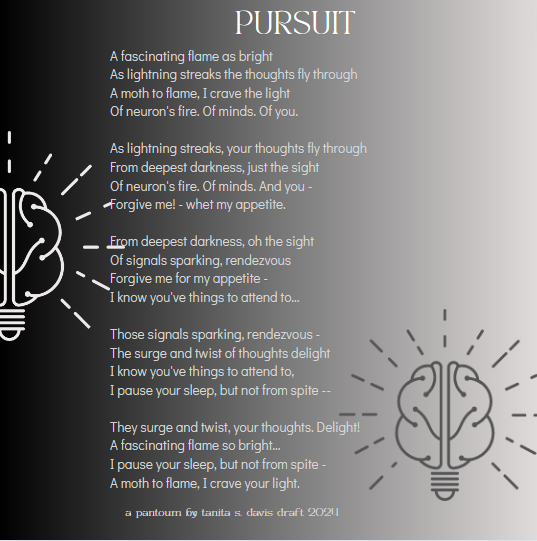
Pursuit
A fascinating flame as bright
As lightning streaks the thoughts fly through
A moth to flame, I crave the light
Of neuron’s fire. Of minds. Of you.
From deepest darkness, just the sight
Of neuron’s fire. Of minds. And you –
Forgive me! – whet my appetite.
Of signals sparking, rendezvous
Forgive me for my appetite –
I know you’ve things to attend to…
The surge and twist of thoughts delight
I know you’ve things to attend to,
I pause your sleep, but not from spite —
A fascinating flame so bright…
I pause your sleep, but not from spite –
A moth to flame, I crave your light.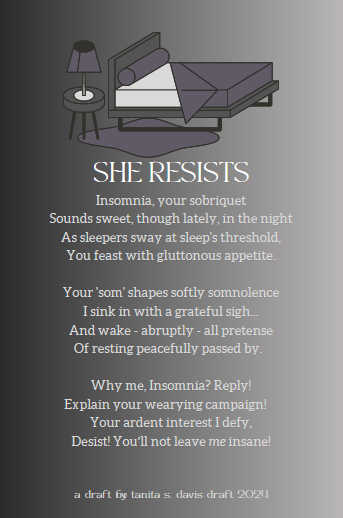
She Resists
Insomnia, your sobriquet
Sounds sweet, though lately, in the night
As sleepers sway at sleep’s threshold,
You feast with gluttonous appetite.
I sink in with a grateful sigh…
And wake – abruptly – all pretense
Of resting peacefully passed by.
Explain your wearying campaign!
Your ardent interest I defy
Desist! You’ll not leave me insane.{pf: the poetry peeps are piñata-ing}
Welcome to another Poetry Friday Poetry Peeps Adventure!
From Process…
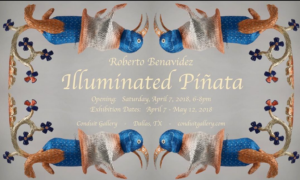
…To Poem
